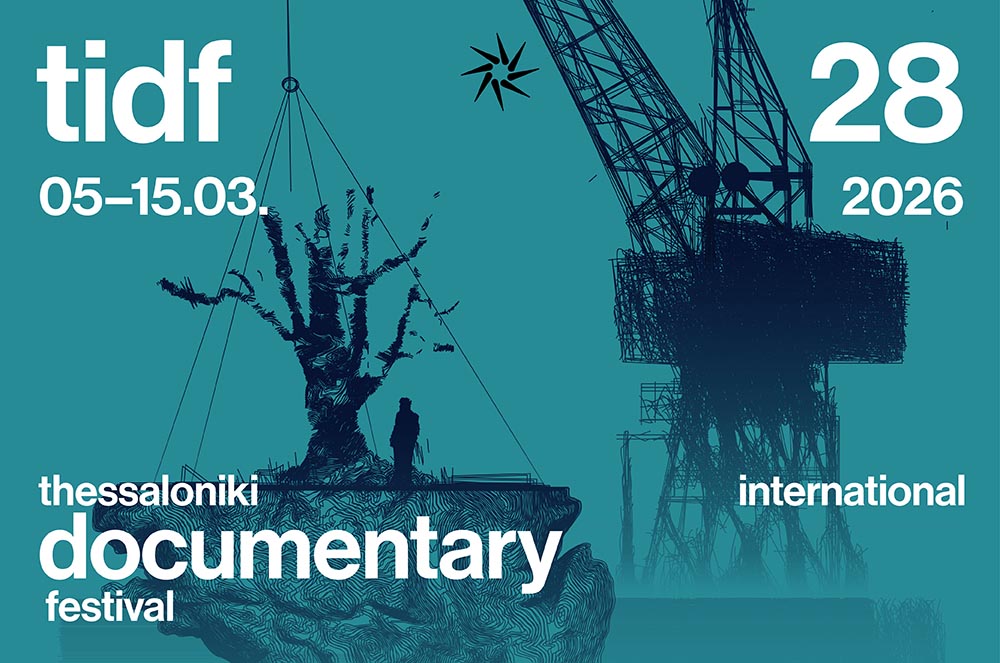The Thessaloniki International Film Festival will bestow an honorary Golden Alexander to the renowned filmmaker Yorgos Tsemberopoulos, one of Greece’s most beloved film directors, with many huge hits under his belt, for his overall contribution to the art of cinema. The 66th TIFF will host a large-scale tribute to his work, featuring his entire full-length filmography. Audiences will also have the opportunity to watch for the first time four rare and unknown to the wider public short films he shot in the U.S. in the late 1970s, during his studies at the American Film Institute in Los Angeles. In addition, the Festival will also present Black & White by Thanasis Rentzis and Nikos Zervos, a deeply anti-dictatorial film made shortly after the 1973 occupation of the Athens Law School, with Yorgos Tsemberopoulos in the lead role.
Moreover, the audience will have the chance to attend a fascinating masterclass, where Yorgos Tsemberopoulos will unveil and share the secrets of his art. In addition, the films Take Care (1990) and Stelios (2024) will be screened with universally accessible terms, with the support of the Festival’s Accessibility Sponsor, Alpha Bank. Last but not least, the Festival’s special edition First Shot will be exclusively dedicated to Yorgos Tsemberopoulos, including rare photo footage, an extended interview, as well as original texts and articles on his life and work.
“Yorgos Tsemberopoulos’ insightful gaze and his human-centered approach echo the frustrations of a class of people, who have rarely been portrayed on the big screen with such lucid clarity. We are delighted to host this tribute, which offers us the chance to honor a renowned filmmaker, a valuable partner and friend,” stresses the Festival’s Artistic Director, Orestis Andreadakis.
“Oh my gosh! Receiving an award for my work? That’s a hell of an honor! Thessaloniki has provided me with nothing but joyous moments throughout my entire life! It’s a generous and giving city, the city of all five senses. And a sixth one Ι might add, this unique sense we get while strolling on a lonely walk by the seaside, carrying within us the film we just watched at the Festival, which found a way to our heart. I love this city, I love the Festival and its people. I have joined forces with this exceptional team, that’s why this award holds a special importance to me,” points out Yorgos Tsemberopoulos.
At the very core of Yorgos Tsemberopoulos’ film universe one finds the passions and desires of people against the backdrop of today’s metropoles and of a drastically changing Greece. Six full-length films directed by Yorgos Tsemberopoulos will be screened at the 66th Thessaloniki International Film Festival, among which the legendary documentary Megara, which he directed alongside Sakis Maniatis. The tribute unfolds the creative thread behind Yorgos Tsemberopoulos’ work as a film director, a screenwriter and a producer, from his early steps all the way to his latest film Stelios, the biggest box-office hit in Greek cinema of the recent years, which outlines the life and work of the prolific Greek singer Stelios Kazantzidis, having gained distribution in many countries worldwide.
Who Is Yorgos Tsemberopoulos:
Yorgos Tsemberopoulos studied cinema at the American Film Institute in Los Angeles, where he spent six years directing documentaries, short films and theatre productions. Throughout his time-honored career, he has gone through all film production stages: he has been a film actor, an assistant director alongside acclaimed filmmakers, a film director, a screenwriter and a producer, also having an important stint as producer of advertisement films over the last 25 years. His multidimensional experiences have been embodied in his directorial work, in the way he works with actors and the trust he inspires in his crew. In addition, he has served Greek cinema at an institutional level too, both as the President of the Hellenic Film Academy from 2019 to 2022, and as a member of the Board of Directors at the Thessaloniki International Film Festival, from 2015 to 2019, and the Greek Film Centre in 1991 and 1992.
The full-length films by Yorgos Tsemberopoulos:
The documentary Megara (1974), directed and written by Sakis Maniatis and Yorgos Tsemberopoulos, turns the spotlight on the unbreakable bond between man and his native soil, the way the landscape shapes its inhabitants – and their political awareness – and the importance of localness as a means of resistance. The film is rightly considered one of the most important Greek documentaries of the last fifty years. Filmed at a time when the concept of ecology was non-existent in Greece, the documentary follows the struggle of the inhabitants of Megara against the Junta’s decision to expropriate a large area of farmland to build an oil refinery. The last part of the film documents the farmers’ decision to join the students of the Athens Polytechnic in November 1973 following their unjust treatment by the state and the courts. The struggle for survival of the rural people of Megara and their relationship with their land are still strikingly relevant today. A true landmark of political cinema and the first eco documentary ever to be shot in Greece, Megara was hailed in its international festival journey, snatching the Audience Award and the Best Production Award at the 1974 Thessaloniki International Film Festival, as well as the FIPRESCI Award at Berlin’s Forum Film Festival.
The film Sudden Love (1984), written and directed by Yorgos Tsemberopoulos, is based on the novel Talgo by Vassilis Alexakis. Eleni is thirty-three, a would-be dancer who no longer dances, a married woman no longer in love with her husband, leading an uneventful life. Grigoris is a successful economist, a career man, who lives in Paris married with a French woman and has two children. He feels nostalgia for Greece and his boyhood years there. When they meet, they feel a sudden love for each other, a love that thrills them and threatens their quiet lives. Their love takes them to Lisbon, and perhaps even further. Starring Betty Livanou, Antonis Theodorakopoulos, Nikitas Tsakiroglou and Thanasis Papageorgiou, the film was bestowed with the Greek National Awards in the Best Film, Best Cinematography and Leading Actress categories.
Take Care (1990), written by Vassilis Alexakis and Yorgos Tsemberopoulos, is based on the titular novel by Yovanna. Seeing his dream to become a singer in the big city crumble, a young man will find a job at a butcher shop and inadvertently act as a catalyst in the life of three women. Small insignificant dramas played out every day without ever hitting the news. The setting is the archetypal "Athenian apartment", a futile test tube where needs, dreams, and passions stir. Starring Alkis Kourkoulos, Ketty Papanika, Nikos Dimitratos, Tania Tripi, Vanna Barba and Kostas Koklas, the film was bestowed with the 1991 Greek National Awards 1991 in the Best Film, Best Screenplay, Leading Actress, Leading Actor and Supporting Actor categories.
The Festival will screen the beloved film with universally accessible terms, reaffirming its commitment to the institution of universally accessible screenings thanks to the valuable support of Alpha Bank, the Festival’s Accessibility Sponsor. More specifically, the film will be accompanied with an Audio Description for the blind and the visually impaired, as well as with Subtitles for the Deaf or hard of Hearing in both its physical and online screenings.
Back Door (2000), written by Yorgos Tsemberopoulos and Dennis Iliadis, takes us back to the tumultuous 1960s. Thirteen-year-old Dimitris unexpectedly loses his father. Seeing his pampered mother collapse, the boy gets carried away and decides to skip childhood in order to stand by her. When he feels ready, he has to claim his mother back from an up-and-coming star of the military regime. A brutal coming-of-age story, where Dimitris reacts in vengeance, changing thus the course of Greek history. The film won the Supporting Actor Award at the 2000 Thessaloniki International Film Festival. Konstantinos Papadimitriou, Alexandriani Sikelianou, Andreas Kontopoulos, Ieroklis Michailidis, Antonis Kafetzopoulos, Matias Simounets, Charis Sozos, Elisavet Moutafi, Efi Papatheodorou, Maria Solomou, Katerina Tsavalou, Eleni Kokkidou, Akindynos Gkikas.
In the film The Enemy Within (2013), written by Yannis Tsiros, 48-year-old Kostas, a progressive ideologist agriculturist, lives a regular life with his wife and their teenage daughter and son, until their home is ransacked by a hooded gang. The experience of extreme violence shatters the family’s peace, bringing grandfather’s hunting rifle violently into their lives. This is the story of a morally demolished man who used to be the pillar of his family and of his struggle to get life and consciousness back to normal. Starring: Manolis Mavromatakis, Maria Zorba, Yorgos Gallos, Antonis Karystinos, Thanasis Papageorgiou, Ariadni Kavalierou, Ilias Moulas, Kostas Antalopoulos, Nikos Dalas, Yannis Niarros, Konstantinos Moraitis, Anna Kalaitzidou, Thanos Grammenos, Tudor Chirila, Vesela Kazakova. The film took part at the Competition Section of the Beijing International Film Festival and in London’s BFI, also participating in many more film festivals all over the world, among which the ones held in Montreal, Paris, Nashville, Denver. The film won, among others, the Best European Independent Dramatic Feature at the ECU European Independent Film Festival, the Silver Djed Pillar at Egypt’s Luxor Film Festival, the Best Actor Award at the Tehran International Film Festival, as well as the 2014 Iris Awards for Best Directing, Best Screenplay and Editing.
Yorgos Tsemberopoulos’ most recent film, Stelios (2024), written by Katerina Bei, is a homage to the prolific Greek singer Stelios Kazantzidis. The touching story of a child from a Pontic refugee family who managed to survive and thrive against all odds, thanks to his immense talent and resilience in the face of social and personal challenges. Music, love, family, friends, fishing, creativity, people of the night, hardcore fans, and intense conflicts come together to create the mosaic of his life. The film won the 2025 Iris Awards for Supporting Actress and Best Costume Design. Starring: Christos Mastoras, Klelia Renesi, Asimenia Voulioti, Agoritsa Oikonomou, Dimitris Kapouranis, Anna Symeonidou.
The short films directed by Yorgos Tsemberopoulos:
In Woman in Trap (1977), Carol, an emerging L.A. model, returns home with a boring ad-executive she got stuck with. But the audience knows that a weird intruder is hiding in her bedroom.
A Sojourner (1978) is a person who lives in a place temporarily, a traveler who stays for a while and moves on; he has no permanent home. John Ferris, an international journalist living in Europe, during a flash-trip back to the States for his father’s funeral, he thinks things over and decides to visit his ex-wife after a long time and meet her new family. Over dinner, when asked, he lies about his personal life in Paris…
In Harry Belten (1979), the titular hero, a hardware store clerk in a small Illinois town in 1959, is 64 years old when he unexpectedly sets a goal for himself and announces it: “A year from now I will perform The Mendelssohn Violin Concerto with a full orchestra in a regular symphony hall in the City of Springfield!” We follow him fighting to make this happen against all kinds of odds, in his own particular way.
W.A.R.N. - Women of All Red Nations (1980) takes us to the Pine Ridge Indian Reservation, a vast Native American reservation in South Dakota, home to the Lakota Sioux Tribe. Established in 1889, it is one of the largest reservations in the U.S., a historically significant site including Wounded Knee. In 1980, we visited the area with a small camera, invited by W.A.R.N.
Yorgos Tsemberopoulos as an actor:
In Black & White (1973) by Thanasis Rentzis and Nikos Zervos, Yorgos Tsemberopoulos portrays a young man who arrives in Athens to study at the School of Fine Arts. He distances himself from the events of the Polytechnic uprising, wishing to devote himself to his studies. At the same time, he begins a relationship with a young woman, he gets a job in an art gallery, and then in an advertising company. The film was shot after the occupation of the Law School in 1973 and was screened during the Polytechnic uprising at “Alkyonis” cinema in Athens, shortly before it was shut down due to the measures imposed by Ioannidis’ new junta.















